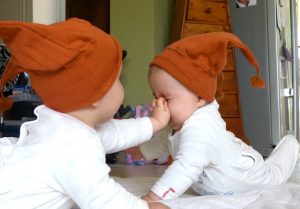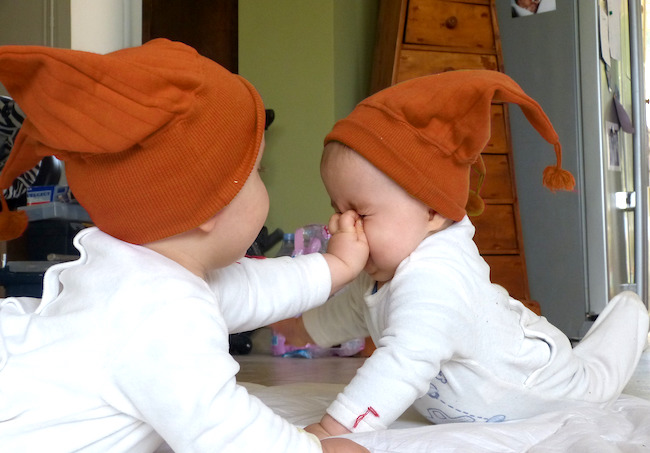
Although Yaakov and Eisav were twins, they seem to be opposites in every way. Yet, Chazal tell us that the differences between them were not obvious. In many ways, Eisav took on the appearance of the tzaddik (1).
This is the story of the impostor. There have been false messiahs — but there have been false prophets, as well. (Among the heart-breaking struggles of Yirmiyah Hanavi, we find that he clashed with “nevi’im” who contradicted his nevu’os (2)).
At the same time, tzaddikim have been falsely accused of terrible things. Who were as great as the authors of Mesilas Yesharim and the Urim V’tumim? Yet, they were pursued relentlessly by their detractors (3).
Which Side?
Anyone living in the days of the avos might very well have chosen the side of Eisav. After all, Yaakov acted in a deceptive manner — it doesn’t look right.
Yet, the navi Malachi states (4): ” ‘I have loved you,’ says Hashem. But you say: ‘How have You loved us?’ ‘Was not Eisav Yaakov’s brother?’ says Hashem — ‘I loved Yaakov; but Eisav I hated…’ ” The Malbim explains that the love for Yaakov was not because of the merits of the Avos — for if so, Eisav would have been included. Rather, Yaakov earned this love, but Eisav aroused anger due to his behavior (5).
People often feel sorry for Eisav — then criticize the sons of Yaakov who strove with their brother Yoseif. But the reverse is appropriate. Eisav never regrets his immorality, while the brothers express remorse (Bereishis 42:21). When Yoseif challenges them regarding their lack of sensitivity to their father — they are stunned and have no response (see Beis Halevi, Bereishis 45:3). (There are many more distinctions!)
The unequivocal lesson: stay far from machlokus! You might choose the wrong side; you might say the wrong thing (6).
Jealousy Can Lead To Murder
The Torah tells us that Eisav hated Yaakov because of the brocha that his father had given. Eisav decided that when his father would pass on, Eisav would kill Yaakov (Bereishis 27:41).
Jealousy, as bad as it is, is a common enough trait. But because he was jealous of the brochos he would kill his brother? We see Eisav’s true colors… Rivka Emeinu exposed Eisav for what he truly was (7).
Baruch Hashem that Eisav would not kill his brother in the presence of his father… this gave Yaakov the opportunity to flee. That his mother was still alive, however, did not seem to affect Eisav’s behavior.
Honor of Parents
Eisav’s reluctance to hurt Yaakov while Yitzchak was alive is important. Parents want their children to get along, and Eisav was cognizant of his father’s honor. Eisav’s lack of respect for his mother, however, thwarted his aspirations. We get the idea that Eisav’s respect for his father was because he thought he could manipulate Yitzchak (8) — which is exactly what Chazal tell us (9). But he couldn’t manipulate Rivka, and this led to his downfall: Rivka would intervene (10)!
———————————————————————————–
1. Rashi gives seemingly foolish questions that Eisav asked, attempting to display his wisdom. However, Rav Moshe Sternbuch shows that the questions were actually quite profound (Sefer Chochma V’da’as).
The Biala Rebbe, quoting the Divre Bina, explains that Eisav was actually on a higher level than Yaakov; Rivka, however, saw that he would not be able to overcome his evil inclination (Sefer Mevaser Tov).
2. See, for example, Yirmiyah chapter 28.
3. To this day, one of the great authors of earlier generations, mentioned reverently by many Gedolim, stands accused of being a follower of Shabbtai Tzvi. This has been disproved in recent decades (numerous volumes published in Bnei Brak), yet the accusation has left its mark, and the reputation of this holy author diminished.
4. Malachi 1:2-3 – the haftorah for this week’s sidra.
5. Rav Yitzchak Hutner explains that the closer the external similarities, the more profound the internal differences. That’s why the navi says: “‘Was not Eisav Yaakov’s brother?’ says Hashem — ‘yet I loved Yaakov; but Eisav I hated…'” Even though superficially they were similar, upon closer inspection we see the vast differences between them (Pachad Yitzchak, Purim, ma’amar 6; also see ma’amar 35).
6. The brother of the Vilna Gaon (the author of Ma’alos Hatorah), was so disturbed by the machlokus between the Misnagdim and the Chassidim that he moved away (Introduction to Ma’alos Hatorah, New York, 1946). The Gaon himself, in spite of his fierce opposition to the Chassidim, vigorously refused to hear them slandered (Ma’aseh Rav Hachadash, 17).
7. Yaakov, though, was afraid of killing, even in self-defense (Rashi, Bereishis 32:8). The commentaries debate why this was so.
8. The commentaries explain that Yitzchak was not fooled by Eisav, but had reasons for choosing him.
9. Rashi, Bereishis 27-28.
10. Ramban asks, why didn’t Rivka tell Yitzchak that she knew through nevuah that Yaakov would receive the brochos? (Bereishis 27:4) Targum Onkelos, as well, states that Rivka told Yaakov that she knew through nevuah (Bereishis 27:13).


